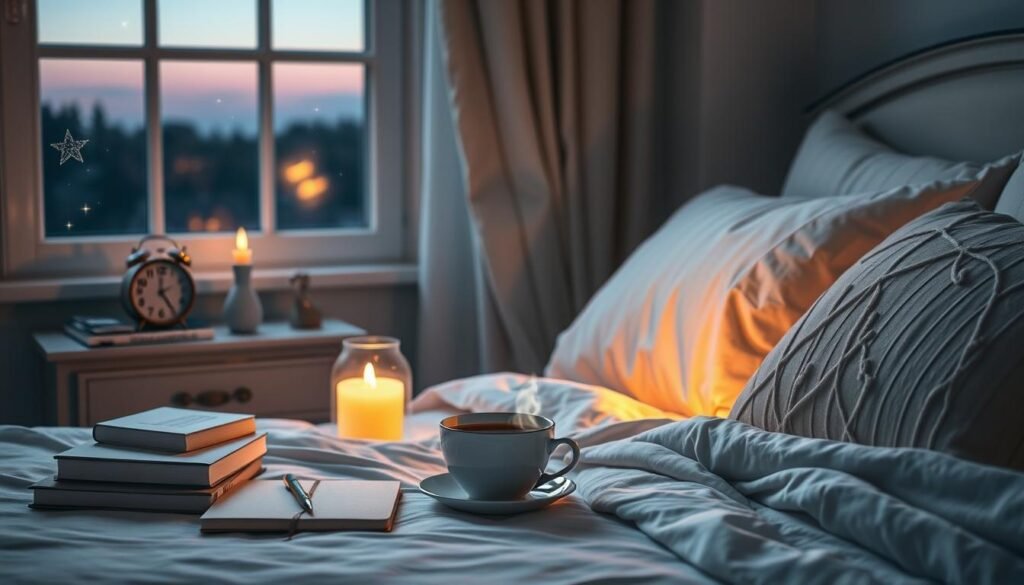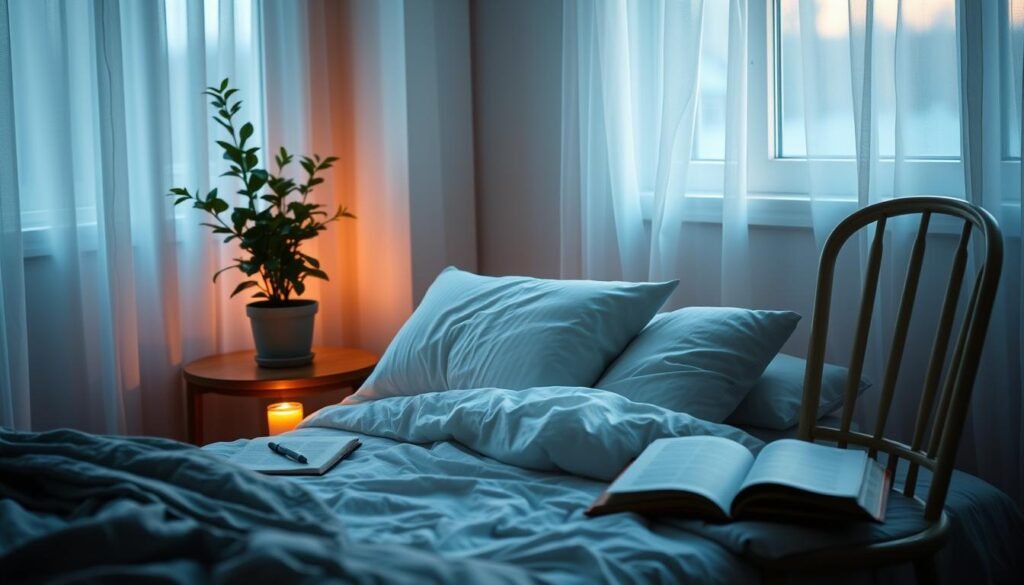Did you know over 60 million Americans struggle with poor sleep? This isn’t just a big number. It shows a big need for ways to improve sleep without pills. Poor sleep can lead to serious health problems. These include depression, obesity, and heart disease. Dr. Charlene Gamaldo, at Johns Hopkins, believes natural methods can make a big difference. This article will share tips on how to sleep better without relying on medication. By following these tips, you can enjoy healthier sleep patterns and better sleep hygiene.
Key Takeaways
- Over 60 million Americans experience poor sleep quality.
- Natural remedies like warm milk and chamomile tea can promote better sleep.
- Establishing a regular sleep schedule helps in regulating sleep patterns.
- Exercise improves overall sleep quality by boosting deep sleep.
- Creating a cool, dark environment promotes restful sleep.
Understanding the Importance of Sleep
Quality sleep is key to our health. It is recommended that adults get at least seven hours nightly. Good sleep boosts brain functions, like memory and focus. Not sleeping enough can lead to mood swings, heart disease, and even diabetes.
Many people don’t see the big deal in getting enough sleep. Studies show that long naps during the day can mess up night sleep. It’s best to keep naps under one hour. Regular exercise can make sleep better. If sleep problems keep happening, it’s important to see a doctor.
Not sleeping enough can cause serious health issues, such as obesity and high blood pressure. Most of a person’s day should include sleep. This time is crucial for the brain to form pathways for learning. Lack of sleep makes concentrating and responding hard, making everyday tasks a challenge.
Each age group needs a certain amount of sleep. Babies might need 16-18 hours, while kids need about 9.5 hours. Adults should aim for 7-9 hours of sleep. Older adults need the same but often have trouble sleeping. Light exposure greatly impacts our sleep patterns, making it hard to fall asleep and stay asleep.
Common Causes of Sleep Disturbances
Many people struggle with sleep issues, with about one-third facing challenges sometimes. Stress from work, family, and odd schedules plays a big part. These stressors can lead to insomnia, making it hard to get good sleep.
Environment matters too when it comes to sleeping well. Noises and too much light can stop the body from relaxing. Bad eating habits and not moving enough can mess with sleep and health.
People try different ways to sleep better. Some advice they might follow includes:
- Avoiding stimulants such as caffeine and alcohol before bedtime.
- Establishing a consistent sleep schedule to regulate the body’s internal clock.
- Engaging in relaxation techniques like breathing exercises and meditation.
Don’t overlook how daily life affects sleep. Things like jogging or brisk walking can help you relax better. But, we’re still learning how exercise exactly helps with sleep problems. Knowing what causes sleep troubles helps in finding the right fixes.
Tips for Improving Sleep Without Medication
You don’t always have to use medicine to get better sleep. Natural methods can help you develop healthy sleep patterns. This improves your overall health. Here are some tips to create good sleep habits and routines for restful nights.
Embrace Healthy Sleep Hygiene
Good sleep hygiene is key for better rest. It means keeping your sleeping area clean and your bedtime routine calming. Less clutter leads to a peaceful mind, making it easier to relax.
Using calming smells like lavender and making your bedroom dark and quiet can make a big difference in your sleep.
Establish a Consistent Sleep Schedule
Sticking to a regular sleep schedule helps set your body’s clock. Waking up and going to bed at the same time every day improves your sleep. It also aligns with your body’s rhythms.
Manage Caffeine and Alcohol Intake
It’s important to watch how much caffeine and alcohol you consume for better sleep. Avoid caffeine in the afternoon and evening to not mess up your sleep. While alcohol might make you feel sleepy, it can make your sleep worse.
Being careful with these can help you sleep better at night. For more tips on improving your sleep, check out this helpful guide.
Creating an Optimal Sleep Environment
Making your sleep area comfortable is crucial for good rest. It’s important to reduce anything that might disrupt sleep, like bright lights or an uncomfortable room temperature. Here are some tips to make your bedroom better.
Reduce Light and Noise Distractions
To sleep well, a dark room is essential. Using heavy curtains or blackout shades can block outside light. Also, to keep noise away, try earplugs or a white noise machine. Adding calming scents like lavender can also make a room more relaxing.
Maintain an Ideal Room Temperature
Keeping your room at the right temperature helps you sleep better. The best range is between 60 and 67 degrees Fahrenheit. You might need to try a few settings to see what’s best for you. A cooler room means a better night’s sleep with fewer interruptions.
To find out more on how different factors affect sleep, check out this site. Making some changes can help match your sleeping space to your needs. This can help you enjoy more refreshing sleep.
Implementing Relaxation Techniques
Many people find it hard to sleep because of stress and anxiety. Today, these issues impact about a third of adults. Adding good relaxation methods can greatly improve sleep. Breathing exercises help calm your mind. Meditation adds to mental clarity and lowers stress. Together, they make a peaceful setting that helps you sleep better.
Practice Breathing Exercises for Sleep
Slow, deep breaths trigger the body’s chill-out mode. Methods like diaphragmatic breathing cut stress and boost relaxation. They also make breathing easier. The 4-7-8 technique is a favorite. It uses special breathing patterns. This method controls breathing speed and makes you feel peaceful.
Incorporate Meditation into Your Routine
Meditation lowers stress, both in your mind and body. Techniques like body scans or yoga nidra focus on relaxation. This focus makes falling asleep easier. Non-Sleep Deep Rest, or NSDR, provides rest without actual sleep. Regular use of these techniques improves sleep quality over time.
| Relaxation Technique | Benefits | Duration |
|---|---|---|
| Deep Breathing | Activates relaxation response, reduces stress | 5-10 minutes |
| 4-7-8 Technique | Calms the mind, controls breath speed | 5 minutes |
| Body Scan | Enhances body awareness, reduces tension | 10-15 minutes |
| Progressive Muscle Relaxation | Induces physical relaxation, aids sleep onset | 15-20 minutes |
| Yoga Nidra | Facilitates deep relaxation, lowers anxiety | 30 minutes |
Incorporating a Bedtime Routine
Creating a bedtime routine helps improve sleep. Having set activities before bed tells your body it’s time to relax. This method greatly improves sleep quality each night.
Activities to Include Before Sleep
Adding calming activities before bed can make a big difference. Here are some ideas:
- Reading: Just six minutes with a good book can cut stress by nearly 50%.
- Meditation: This reduces anxiety and improves sleep by focusing the mind.
- Warm Baths: A warm bath before bed can help you sleep longer and better.
- Light Stretching/Yoga: These help calm your mind and relieve stress before bedtime.
- Preparation for the Next Day: Planning tomorrow for about 15 minutes helps clear your head for a restful night.
Limiting Screen Time Before Bed
Reducing screen time is key for a healthy bedtime routine. Screens’ blue light can make you more alert and ruin your sleep. Avoid screens for at least an hour before bed. Choosing activities without screens can help you relax and sleep easier. Following this tip leads to higher quality sleep, as research confirms.

Utilizing Natural Sleep Remedies
Many people look for natural ways to sleep without using drugs. They often try herbal aids and warm drinks. These can help you relax and sleep better.
Herbal Sleep Aids and Their Benefits
Herbal sleep supports like Valerian root are popular for relaxation. But, they might cause headaches or upset stomach for some. Chamomile tea is another favorite for nighttime. It has a soothing smell that can help ease stress, even if its benefits against insomnia aren’t proven.
Melatonin supplements are a common choice too. A small dose can help you fall asleep quicker and sleep longer. Though some people might feel drowsy or get headaches the next day, others find them helpful.
Warm Beverages for Sleep Promotion
Drinking something warm before bed can be comforting. Chamomile tea and warm milk are known for their calming effects. Their warmth signals your body it’s time to rest. Making this a regular nighttime practice can improve your sleep.
It’s important to be careful with herbal aids and warm drinks, as they work differently for everyone. The key is to see what suits you best when looking for natural sleep solutions.
The Role of Physical Activity in Sleep Quality
Being active is key to sleeping better. When you exercise regularly, you can improve your sleep. It’s important to know which exercises to do and when to do them.
Aerobic Exercises and Their Effects
Aerobic exercises like running, swimming, or cycling can boost your sleep quality. Studies say if you’re active for 30 minutes a day, you might sleep longer by about 15 minutes. People with insomnia also sleep better if they do exercises like these regularly. This leads to a deeper and more refreshing sleep.
Timing Your Workouts for Better Sleep
Choosing the right time to exercise is important for good sleep. Working out too close to bedtime could keep you awake. Try to finish your exercises 1 to 2 hours before going to bed. Some find that exercising at different times doesn’t affect their sleep, so see what works for you. Mixing right exercise timing with good sleep habits can improve your life.

| Findings | Details |
|---|---|
| Insomnia Prevalence | 10% to 30% of adults experience insomnia, with some rates reaching 50-60% |
| Exercise Duration | 30 minutes of daily exercise correlates to an average of 15 minutes longer sleep |
| Improvement for Insomnia Patients | Regularly exercising for 30 minutes three times a week showed better sleep quality |
| Morning Exercise Benefits | Men who engage in 10 minutes of morning light physical activity gained an extra 2.56 minutes of sleep |
| Exercise and Sleep Timing | Exercising at least 1 to 2 hours before bedtime can enhance sleep quality |
Addressing Insomnia with Cognitive Behavioral Therapy
Cognitive Behavioral Therapy for Insomnia (CBT-I) is a program that helps people identify and change the thoughts and actions that affect their sleep. It’s known for its success with both short-term and ongoing insomnia. People looking for better sleep see improvements by going through 6 to 8 sessions customized for them.
Understanding the Basics of CBT for Insomnia
CBT-I believes changing thoughts and actions can lead to better sleep. About 70% to 80% of patients see major benefits. They fall asleep faster and wake up less during the night.
Relaxation methods taught here also help with anxiety, anger, and depression. The American College of Physicians recommends CBT-I first for insomnia. It works as well as medicines but without the bad side effects.
When to Seek Professional Help
Some people still struggle with sleep, even after trying to fix it themselves. In the U.S., there aren’t enough experts in sleep behavior. So, it’s important to seek help early.
There are signs that it’s time to find a professional, especially if sleep problems don’t get better or get worse. Getting help early can greatly improve how you manage insomnia and your overall sleep.
Maintaining a Healthy Lifestyle
A healthy lifestyle greatly affects how well you sleep. Choosing the right foods and managing your well-being are key. Eating nutritious foods and keeping stress low are important for deep sleep.
The Impact of Diet on Sleep Quality
Your diet and sleep are closely connected. Eating a mix of fruits, vegetables, whole grains, and good fats can help you sleep better. Certain nutrients help make sleep-helping hormones. It’s also good to avoid big meals and things like caffeine and alcohol before bed. This helps you sleep more soundly.
Creating a bedroom just for sleep helps make it a restful place. This setting helps your mind relax and ready for sleep.
The Importance of Stress Management
Managing stress well can make your sleep better. A lot of stress can break your sleep routine, causing insomnia in some people. Using mindfulness, meditation, and relaxation techniques can lower your stress. This makes sleeping easier.
Organizing your tasks and setting priorities can also reduce stress. This makes it easier to relax and fall asleep at night.

Monitoring Your Progress
Keeping track of sleep patterns can really help you understand your sleep better. By writing down sleep times, wake-up times, and how well you slept in a journal, you create an important tool. This tool helps you see what’s helping or harming your sleep, making it easier to find ways to sleep better.
Keeping a Sleep Journal
A sleep journal keeps a detailed record of how you sleep. You should write down:
- Date and time of going to bed.
- Time taken to fall asleep.
- Number and duration of awakenings.
- Time of waking up.
- Overall mood and energy levels upon waking.
When you keep track of your sleep, you’ll start to see patterns. These patterns can show you how changing what you eat or how much you exercise affects your sleep.
Identifying Patterns Over Time
Looking over your sleep journal from time to time can show you interesting trends. You might see how your diet affects your sleep. Or you could learn that what you do before bed impacts how well you sleep. The American Heart Association even says a good diet helps you sleep better.
Using what you learn from your journal can inspire you as you see the progress you’re making towards better sleep. Knowing what works well for you can help you keep improving your sleep habits.
Conclusion
Improving sleep naturally is possible for those with sleep problems. This article covered various strategies to improve sleep. These include understanding sleep’s importance, forming healthy habits, and making your sleeping area better. By following these tips, you can better your sleep quality over time.
Having a regular sleep schedule is key. Relaxation methods like meditation and breathing exercises help too. Regular exercise is also important for good sleep. Adults prefer self-care over medicines for sleep issues, especially with insomnia.
When you try out these sleep tips, be patient and keep at it. Improved sleep doesn’t just mean you’ll rest better at night. It also boosts your overall health and happiness. For more on taking care of yourself for better sleep, check out this informative article.